Like the development stages of a child, there are various phases we go through when bringing new ideas to life.
Nearly 100 years ago, social psychologist Graham Wallas proposed that the creative process adhered to a four-stage cycle: Preparation (readying your cognitive muscles for new ideas), incubation (letting your mind unwind), illumination (letting your ideas crystalise), and verification (unleashing your ideas into the world).
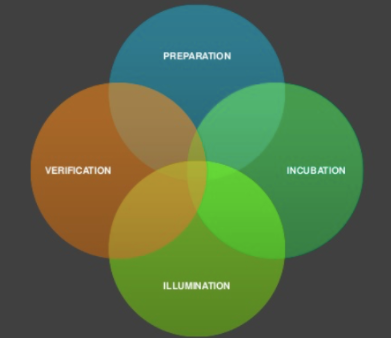
Throughout the year, weeks, and even days — we float through, and in between, these various phases of conscious and unconscious creative work. You circle back again and again in an endless iterative cycle. Before long, not only do you feel (and verify) that you’re doing your best work, you also benefit from continuous strokes of insight.
To optimise for creativity, we need to first know what stage of the creative process we are in. We can then cultivate and protect our work rituals around this remaining cognizant of our work environments, capabilities, energy levels, mood, particular activity at hand, circadian rhythms, and a myriad of other factors. Here are some ideas on how to do just that.
Self-Efficacy
Ever get butterflies before you’re about to do a presentation or reveal that project you’ve been slaving over? Of course you have. These butterflies, or what I like to call productive stress, can jolt you into performing well. After all, confidence isn’t what produces high performance, it’s high performance that produces confidence. The key is to remain humbly confident in your skills, abilities, and aptitude to learn on the fly.

One of the best ways to do this is by preparing your mind, thinking out loud, being vulnerable, and continually verifying (and improving) your performance. There is no such thing as perfection, there’s only approaching mastery.
In a world that’s changing faster than we can fathom, believing in yourself is a need-to-have mindset.
Self-Awareness
Self-awareness is instrumental in helping you be your most creative and perform at your best. You need to keep your peripheral vision popping to see the connections between industries, disciplines, people, places, and beyond.
It’s also useful to understand what type of growth path you’re inclined to take in order to progress in your work and career. Be honest about which style you identify with (and more importantly, ensure to validate it with the outside world):
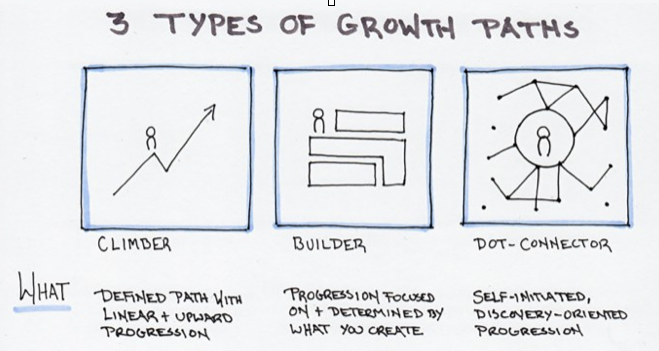
The Climber: describes those who take a defined path through a series of linear progressions. Think of a new manager who rises through the ranks of the company over many years to enter the C-suite.
The Builder: these types define progress by what they create. This may be a filmmaker who is enamored with both the creative process and their creative output. The measure of success is not so much status and position as it is the satisfaction of putting great ideas into the world.
The Dot-connector: These folks are discovery-oriented and progress through self-starting. This is me — I’m on my third career and am sure that by continuing to follow my curiosity, I’m yet to embark on my encore career.
Self-Management
Baby boomers have retired. If we calculate the amount of time the they spent working it’s roughly 100,000 hours. Back in 1980, organisational theorist Charles Handy predicted this would be halved to 50,000 hours for the next new generation. That’s us.

Our careers are getting shorter — many folks spend longer in education and start their professional lives later. Others are retiring earlier. And yet others, those dubbed independents — are retiring in real-time.
Jobs are being compressed — more and more companies are breaking up work and distributing it in new and innovative ways. Handy envisioned the Portfolio Worker and had the prescience to see that work would become much more rich and fluid. It’s now customary to see work as encompassing wage and fee work as well as; emotional work, gift work, study work, and rather ironically, non-work. The point then, is that the modern worker — especially the independents— must become ace at managing their time.
“I work an 80-hour week just so I don’t have to work a 40-hour one.” A nifty claim by Lori Greiner and many an entrepreneur — but somewhat depressing nonetheless. Regardless of your view on working hard, we’ve heard it a million times that it’s all about working smart. And what this really means is managing yourself and forming healthy and long-lasting habits.
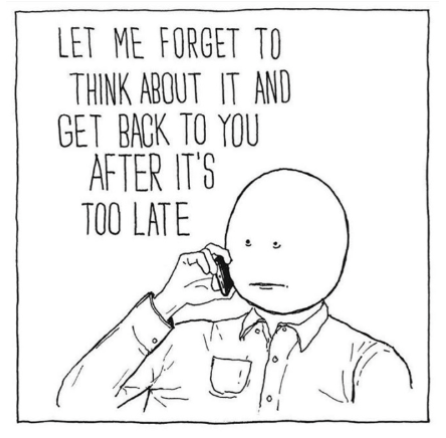
You need to become militant in directing your own time and energy in order to cultivate rich rhythms for doing your best work. Many entrepreneurs manage their time by working in hyper-focussed and efficient bursts, not necessarily round the clock. Taking a two-hour walking meeting with yourself may seem to many as bunking off, yet to others, it’s seen as an absolutely brilliant strategy for staying top of your game.
Forming new habits is hard, and the best way to start is by breaking it down into baby steps. I’m amazed by how many people check their smartphones (others their tablets) first thing in the morning. If that’s you, you likely go straight to your messages and down social media rabbit hole — in effect lining your brain with attention residue. Changing this behaviour is actually quite challenging, and the best way to start is simply by banning technology from the bedroom. The long-term benefits, I promise you, are well worth the discipline.
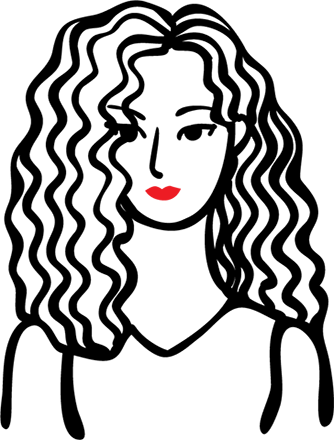
The cue — activity — reward cycle that forms a new habit is something we can rewire by being deliberate. Not only will you feel like you’re in more control, but you’ll also feel that you have more time. By managing yourself and protecting your rituals of work you’ll not only find that you feel more in control, but that you have more time.
Slip-ups will occur, but instead of feeling frustrated or riddled with guilt — welcome it as a chance to reinvent your work regime and get to know thyself.
Dig deeper and answer these questions:
What are you working on?
How do you do your best work?
What do you yearn for?
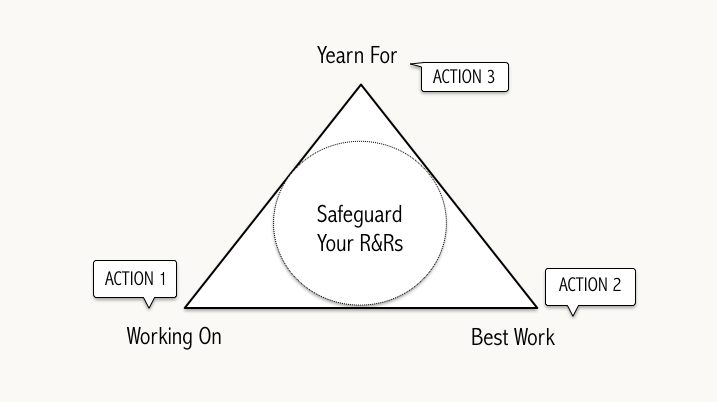
This article is based on my R&R workshop
Originally published on Medium

